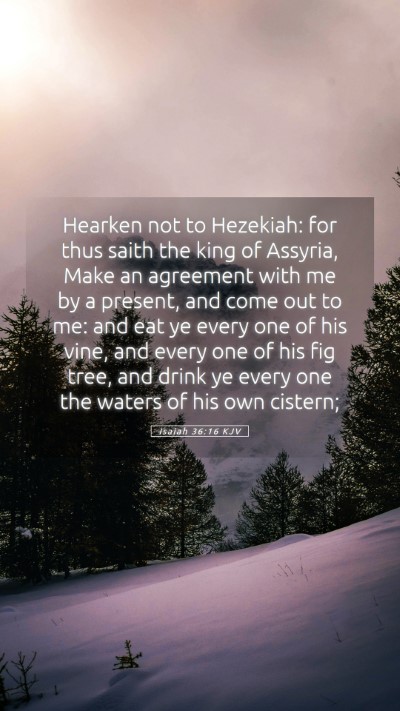Understanding Isaiah 36:16
Isaiah 36:16 states: “Do not listen to Hezekiah. For thus says the king of Assyria: ‘Make your peace with me, and come out to me; and every one of you eat from his own vine and every one from his own fig tree, and every one of you drink the waters of his own cistern.’” This verse depicts a moment of intense negotiation and spiritual testing for the people of Judah during the siege of Jerusalem by the Assyrian king Sennacherib.
Bible Verse Meanings
This verse can be seen as an attempt to persuade the inhabitants of Jerusalem to surrender and turn away from their king, Hezekiah, who had been leading them in faith and reliance on God's promise of deliverance.
Key Insights from Commentaries
- Matthew Henry: Henry emphasizes the temptation that this verse illustrates, where Sennacherib attempts to draw the people away from reliance on God through worldly assurances of peace and security. It serves as a warning against the allure of earthly comforts that can lead to spiritual compromise.
- Albert Barnes: Barnes discusses how the envoy from the Assyrian king represents a powerful adversary trying to undermine the faith of the people. His call to make peace implies sacrificing their spiritual integrity for immediate safety and comfort.
- Adam Clarke: Clarke highlights the significance of the imagery used in this verse—the mention of vines and cisterns symbolizes both sustenance and blessings that the Lord has provided, contrasting sharply with the emptiness of surrendering to the enemy.
Biblical Exegesis of Isaiah 36:16
The verse showcases a pivotal moment in the narrative of the Assyrian invasion, highlighting the conflict between faithfulness to God and the temptations posed by worldly powers. Understanding this passage involves recognizing the broader historical context, wherein God had previously delivered His people in times of crisis.
Historical Context
The events surrounding Isaiah 36 take place during a critical period for Judah, as Assyria was a dominant empire threatening the sovereignty of smaller nations. The invitation to enjoy the comforts of their own land serves to distract them from the right path of faithfulness to God.
Application of Isaiah 36:16
For modern readers, this verse holds practical lessons about resisting temptations that may lead us away from our faith. The king of Assyria’s appeal to peace represents the challenges believers often face when they encounter options that promise relief but demand compromise on spiritual principles.
Practical Insights
- Recognizing when external pressures prompt us to forsake our faith.
- Understanding the importance of staying true to one’s spiritual convictions despite appealing alternatives.
- Finding comfort and assurance in God’s promises amidst trials and temptations.
Bible Study Resources for Isaiah 36:16
For those seeking deeper insights into this scripture, consider using the following Bible study tools:
- Bible study guides that focus on Isaiah and the Assyrian period.
- Online Bible study platforms for group discussions.
- Commentaries that provide verse-by-verse breakdowns and historical context.
Related Scriptures
- 2 Kings 18:17-37: Details the Assyrian siege and the message delivered to Hezekiah.
- Isaiah 37:6-7: God’s assurance to Hezekiah that Sennacherib will be defeated.
- Isaiah 31:1: A warning against seeking assistance from Egypt instead of God.
Conclusion
The analysis of Isaiah 36:16 reveals a crucial moment of spiritual testing during a time of crisis. The temptations presented by Sennacherib serve as a reminder of the constant struggle between faith and the allure of immediate, worldly solutions. Understanding this verse and its implications can deepen one’s Bible study insights and equip believers to apply these lessons to contemporary challenges in maintaining their faith.


